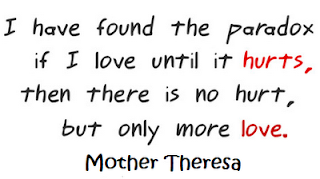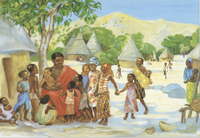 |
| The Visitation by Qi He |
Hail Mary, full of grace.
Our Lord is with you.
Blessed are you among women,
and blessed is the fruit of your womb,
Jesus.
Our Lord is with you.
Blessed are you among women,
and blessed is the fruit of your womb,
Jesus.
This oft said prayer is the blessing Mary receives from her cousin Elizabeth upon greeting her in her home. Mary has just found out that both she and her cousin are miraculously pregnant and she runs to greet her beloved cousin. But one thing the Hail Mary leaves out is the second part of Elizabeth's blessing, found in verse 45,
Blessed is she
who believed that there
would be a fulfillment of what was
spoken to her by the Lord.
Mary has received praise and accolades over the years, worshiped in the Roman Catholic church, and as a result of the Reformation, almost shunned in Protestant churches. And both of these approaches to Mary are unfounded in scripture. What is founded, however, is the respect and honor Mary receives - not because she is the mother of Jesus - but because she was a faithful disciple.
The gospel of Luke reiterates this blessing in chapters 8 and 11, and Mary becomes for us an example to be emulated. While we will not have the opportunity to give birth to God's son as Mary did, each of us has the opportunity to hear God's word and believe it will be fulfilled.
We each hear the Word of the Lord, "One who is more powerful is coming!"
We each hear the Word of the Lord, "I have called you by name; you are mine."
We each hear the Word of the Lord, "I have remembered your sins no more."
We each hear the Word of the Lord, "Stand up and raise your heads, because your salvation is drawing near."
And we each have in us the faith it takes to believe these things. And not only to believe, but to live them out. To live as though there really is a powerful savior coming - not with fear, worry, and dread, but with hope that there will be a better future. To live as though our sins are forgiven - not weighed down by the guilt of past wrongs, but liberated to live anew each day. To live as though God's naming and claiming us as sons and daughters is the foundation of everything else - not aspiring to be identified by jobs, possessions, family, appearances, and status, but living from the fact that we are God's and nothing else matters. To live as though our salvation really is drawing near - not sweating the small stuff but confidently living in each moment knowing that in Christ all will be well.
As we come ever closer to Christmas, I am left pondering Mary and Mary's faithfulness. How can I imitate Mary, the ideal disciple? Do I hear and believe?












